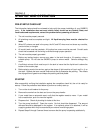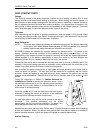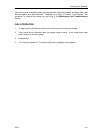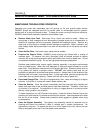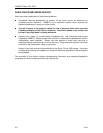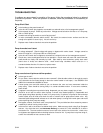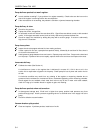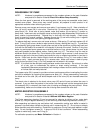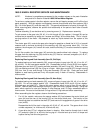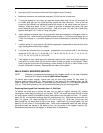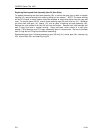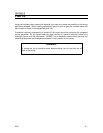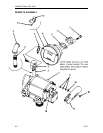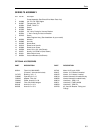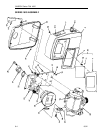
Service and Troubleshooting
0144 5-5
DISASSEMBLY OF PUMP
NOTE: Numbers in parentheses correspond to the numbers shown on the parts illustration
and parts list in Section 6 labeled
Direct Drive Motor-Pump Assembly
.
When the front panel is removed, all the working parts of the pump are accessible under clearly
marked cover plates. Since pump may contain product, be prepared to catch product in an
appropriate container when removing any cover.
Remove pump cover screws and remove cover plate (1) and square ring (2). Note orientation of
rotor (4) and of vanes (36) in rotor slots. Remove key (3) and withdraw rotor and vanes from
pump block (12). Since rotor is spring loaded, make sure washer (6) and spring (7) remain on
pump shaft. Insert new rotor and replace vanes so that trailing edge slopes away from direction of
pump rotation (counterclockwise). Reinstall key in shaft slot and rotor keyway. Check pump
cover for scoring (if scored, replace). Replace square ring (2) and while holding rotor in against
spring tension, slide cover over opening and tighten screws.
To replace shaft seal, remove rotor and vanes as above. Slide spring (7) and both washers (6) off
shaft. O-ring (8) will act as a brake to resist removal of brass, rotating seal ring (9). To overcome
this resistance, lightly grasp brass ring with pliers and pull at the same time turning shaft back and
forth with the flat blade of a screwdriver in the keyslot in the end of the shaft. Remove O-ring from
brass ring and spread some grease over machined surface of ring; reinsert brass ring over shaft
and press greased surface against carbon, floating seal ring (10). The carbon ring can now be
withdrawn stuck to the brass ring. Do not break up the carbon ring to remove it, since some of the
pieces may get lost in the pump casting and cause the rotor or measuring chamber to jam later in
service. Use a bent wire as a button-hook to hook and withdraw O-ring (11) from recess in back
of pump cavity. Install new seal group (5) in reverse order. Make sure recess in back of pump
cavity is clean and that O-ring (11) is firmly seated and not twisted in this recess.
NOTE It is critical that the seal part mating surfaces remain clean and dry. Do not touch or allow
oil of any type to contaminate the carbon or brass mating surfaces. If the seal
inadvertently becomes contaminated, both mating surfaces must be carefully cleaned with
a lint-free cloth and methyl alcohol.
The bypass valve (29) is preset to provide maximum performance without overloading the motor
and can be withdrawn by removing the bypass cover plate (31). When reassembling, make sure
the holed end of the tube (32) and bullet-shaped nose of the valve (29) are inserted toward the
pump.
The check valve is attached to the check valve cover (26) and will come out when the cover is
removed. If you can hear the product in the suction line running back into the storage tank when
this assembly (20) is removed, the check valve is holding and keeping the pump primed. When
reassembling, make sure the rubber valve disc is facing down toward the valve seat.
METER-REGISTER DISASSEMBLY
NOTE: Numbers in parentheses correspond to the numbers shown on the parts illustration
and parts list in Section 6 labeled
1860 and 4860 Meter-Register
.
The B size measuring chamber (5) can be removed for cleaning by taking out four meter body
screws (2), lifting off register assembly (14) and removing three measuring chamber screws (4).
After separating and cleaning top and bottom half, reassemble, making sure baffle is seated in
grooves in top and bottom halves and through slot in measuring disc (7). Do not drop or sharply
strike chamber parts while handling. Rotate disc to make sure it turns freely and replace in meter
body. Do not overtighten screws (4). A torque of 20-25 ft-lbs is sufficient. When reassembling
register to meter body, use a new O-ring (3).
For calibration procedure, see
Meter Calibration
in Section 4.



